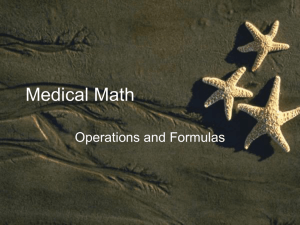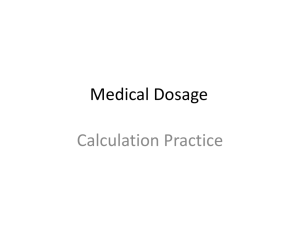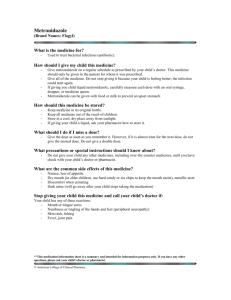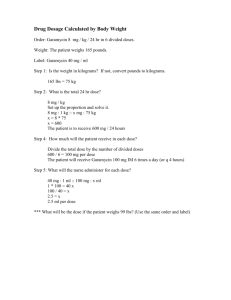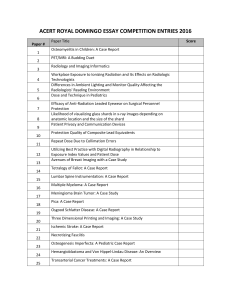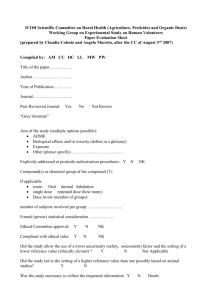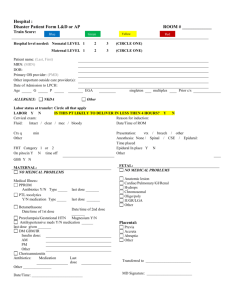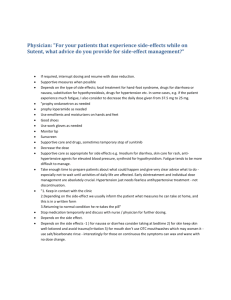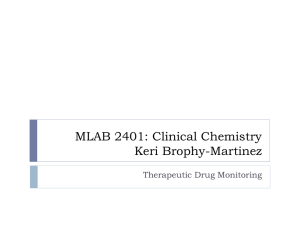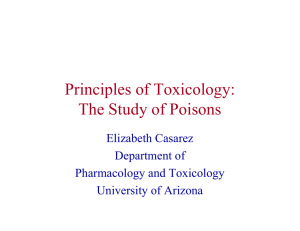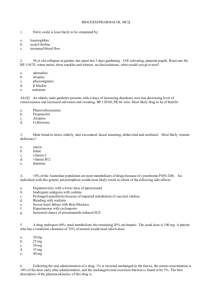pharmacology mcq 1 (2009)
advertisement
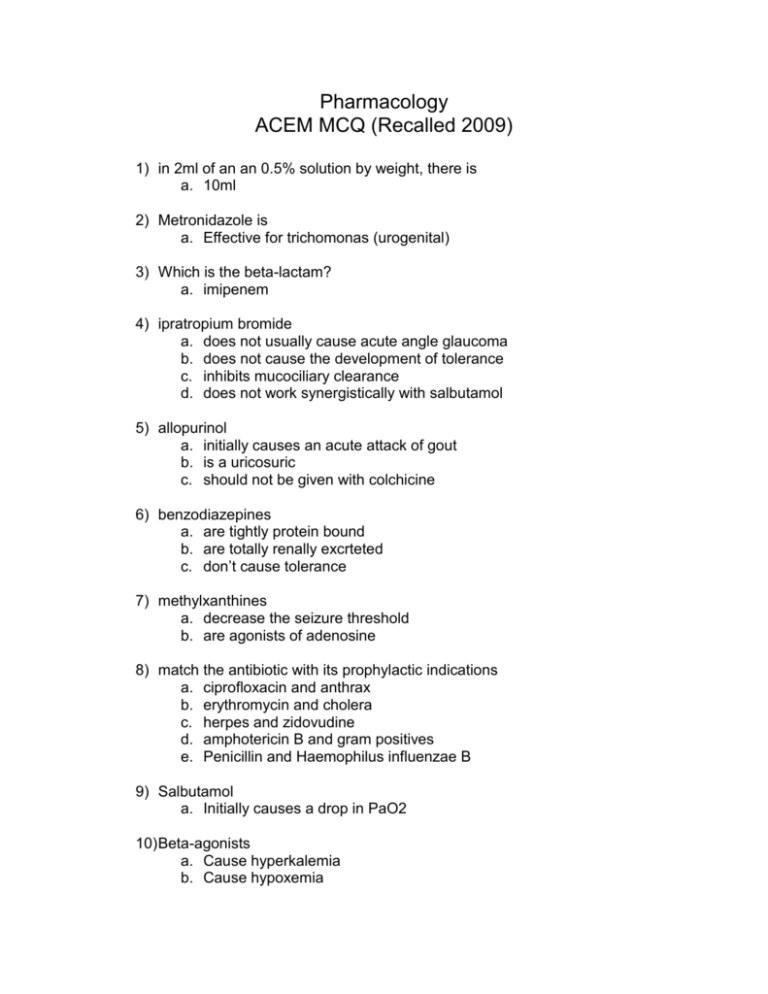
Pharmacology ACEM MCQ (Recalled 2009) 1) in 2ml of an an 0.5% solution by weight, there is a. 10ml 2) Metronidazole is a. Effective for trichomonas (urogenital) 3) Which is the beta-lactam? a. imipenem 4) ipratropium bromide a. does not usually cause acute angle glaucoma b. does not cause the development of tolerance c. inhibits mucociliary clearance d. does not work synergistically with salbutamol 5) allopurinol a. initially causes an acute attack of gout b. is a uricosuric c. should not be given with colchicine 6) benzodiazepines a. are tightly protein bound b. are totally renally excrteted c. don’t cause tolerance 7) methylxanthines a. decrease the seizure threshold b. are agonists of adenosine 8) match the antibiotic with its prophylactic indications a. ciprofloxacin and anthrax b. erythromycin and cholera c. herpes and zidovudine d. amphotericin B and gram positives e. Penicillin and Haemophilus influenzae B 9) Salbutamol a. Initially causes a drop in PaO2 10) Beta-agonists a. Cause hyperkalemia b. Cause hypoxemia 11) H1 blockers a. Are reversible competitive antagonists b. 2nd generation easily penetrate the CNS c. Have no significant antimuscarinic effects d. Postural hypotension is a beta-adrenergic effect 12) cimetidine a. cases confusion in the elderly 13) antidepressant with the highest antimuscarin effect is a. amitryptiline b. imipramine 14) antidepressants a. fluoxetine + alcohol = significant driving ability impairment b. MAOIs can cause hypotension 15) Retinoic acid a. Is 60% absorbed topically b. Causes lipid metabolism abnormalities c. Is safely given to pregnant women 16) An old man is suddenly hypovolemic after receiving diuretics. Which is the most likely cause? a. ACE-inhibitors 17) An old woman takes a drug of some sort, and end s up with a potassium level of 6.2 Which drug is LEAST likely to cause this? a. Naproxen b. Alpha-methyldopa c. ACE-inhibitors 18) Anticonvulsants: match the drug with its adverse effect a. Phenytoin + Vitamin D deficience 19) Antibiotics and their adverse effects a. Penicillin - seizures 20) Alcohol metabolism a. Fomepizole inhibits alcohol dehydrogenase b. Alcohol dehydrogenase is mainly in the stomach c. MEOS is the main metabolic system in eliminating alcohol 21) CYP 450 is a. Localized in the mitochondria b. Participates only in Phase II reaction c. Is induced by nicotine in tobacco smoke d. Is induced by metronidazole 22) Fibrinolysis is affected by a. Aminocaproic acid b. Heparin c. warfarin 23) which is the least likely to cause problems in pregnancy a. heparin 24) clopidogrel works by a. inhibits 80% of the receptor sites within 5 hrs of the loading dose b. affects the ATP pathway of platelet activation c. length of effect is 3 days d. inhibits the prostaglandin pathway 25) which substances cause vasoconstricion a. TXA 2 b. PGI 1 c. PGE 2 d. Histamine 26) Match the mechanism of action a. Abciximab: gpIIb/IIIa inhibitor b. Heparin: binds to antithrombin III c. Aspirin: reversible COX inhibitor 27) Regarding pharmacodynamic and pharmacokinetics a. LD50 is 50% of the minimum lethal dose b. LD50 is 50% of the average lethal dose c. Maximal effect of the drug is its efficacy 28) Loading dose of a drug with a volume of distribution of 0.5ml/kg in a 70kg person with a target dose of 10mg/kg a. 300mg b. 500mg c. 1500mg 29) Ketamine a. Is a cardiovascular stimulant b. Has no emergence phenomena 30) Thiopentone a. Redistribution is faster than metabolism 31) Local anaesthetic side effects: a. Prilocaine causes methemoglobinaemia 32) Propanolol: a. Is a sodium channel blocker b. Is lipid soluble c. Is excreted unchanged 33) Calcium channel blockers a. Diltiazem is a dihydropteridine b. Verapimil decreases conduction in the AVN 34) Which drugs have no effect on warfarin metabolism: a. Benzodiazepines b. barbiturates c. d. e. 35) An overdose patient has tachycardia, hypertension and urinary retention; what did they overdose on? a. Aspirin b. Amphotericin c. Tricyclics 36) Marijuana: a. Causes conjunctival erythema and tachycardia 37) Antiemetics include a. diphenylhydramine 38) metaclopramide a. dopamine agonist b. increases lower oesophageal sphincter pressure 39) ondansetron a. antagonizes the effects of tramadol 40) antiarrhythmics a. procaiamide acts on sodium channels 41) Adenosine a. Depresses potassium conductance b. Decreases the calcium action potential 42) erythromycin a. is suitable for campylobacter jejuni 43) ethylene glycol poisoning a. can cause renal insufficiency b. causes formic acid to appear in the urine 44) metformin a. does not require functioning beta-cells b. can cause acute tubular acidosis 45) alpha receptor activation causes a. uterine relaxation b. cutaneous vessel dilaation 46) effects of coular medications: a. pilocarpine – ciliary muscle contraction b. prostaglandin = reduced secretion c. timolol = pupil ilatation 47) lithium causes all except a. tardive dyskinesia b. dysarthria c. tremor d. nephrogenic DI 48) sulfonamides are analogs of a. folic acid b. PABA 49) Of the following vaccines, which one contains live organism? a. measels 50) pralidoxime a. regenerates acetylcholinesterase b. splits acetylcholinesterase c. increases the release of acetylcholine d. decreases reuptake of acetylcholine
